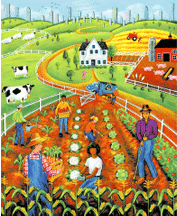News and Resources for CFSC Members
If you are part of a CFSC member organization and others in your group would like to receive this newsletter directly, send their names and email addresses to Rachel Smith.
You can read previous issues at the Grapevine Issue Archive.
Program News
CFSC Receives National Prevention and Wellness Grant
In early July, CFSC joined nine other national organizations in receiving $10 million in grants to promote health and prevent diseasefrom the Department of Health and Human Services (HHS). The funding, which comes through the Communities Putting Prevention to Work (CPPW) initiative as part of the American Recovery and Reinvestment Act of 2009, was awarded for efforts related to fight obesity and tobacco prevention. CFSC Executive Director Andy Fisher said, “This is not only a great honor for CFSC, but also a powerful endorsement of the role of community food system initiatives in promoting public health.”
CFSC will provide technical assistance to the CPPW-funded communities to help them implement environmental and policy changes related to farm to school, healthy corner stores, food policy councils, farmers markets, and local food procurement. We will partner with the National Farm to School Network, Farmers Market Coalition, National Good Food Network, Healthy Corner Stores Network, Public Health Law & Policy, and The Food Trust to provide this assistance. The grant also will support development of an on-line local food policy information center, a National Conference on Municipal and State Food Policy, and other national conferences.
Child Nutrition Train Moves Forward, With Farm to School on Board
For the past 18 months, CFSC has been working diligently on Child Nutrition Reauthorization and we’re making some important headway. This legislation supports crucial programs like school meals, WIC, and summer and after school feeding programs, and is currently set to expire on September 30. Back in March, the Senate Agriculture Committee passed a child nutrition bill, S. 3307, that included $40 million in mandatory funding for Farm to School programs. In July, the House Committee on Education and Labor passed its version of the bill, H.R. 5504, which has $50 million in mandatory funding for Farm to School programs.
The inclusion of mandatory funding for Farm to School in both Committee bills is a major milestone. We need your help to make this funding a reality, and to strengthen programs that reduce childhood hunger and obesity! Call your Members of Congress and ask them to tell leadership to bring Child Nutrition to the floor for a full vote. See the CFSC website for details.
For more on CFSC’s policy work, visit our Policy Update Archives and sign up to receive regular policy updates.
Seeking Harmony in Food Safety Standards… More Voices Welcome
In the past year, food safety standards for agricultural producers have been a hot-button topic. Many of the proposed solutions have raised serious questions and concerns, including whether they will be workable for diverse types of farms. The Produce GAPs (Good Agriculture Practices) Harmonization Initiative is an important voluntary effort aiming to shape standards that will be appropriate for farmers of all scales, crop mixes, production practices, and locations within North America.
The technical working group (TWG) for the Harmonization Initiative is a volunteer body representing many different farms, buyers, produce commodity associations, audit agencies, and GAP standard owners. They examined 13 existing standards in crafting their recommendations. A key intended outcome is to assure market access for farms of all sizes while improving the safety of fresh fruits and vegetables. Specific objectives include eliminating audit supermetrics, audit fatigue and redundancy.
CFSC is collaborating with the National Good Food Network and FamilyFarmed.org to encourage farmers and organizations that represent small or limited resource producers to learn more about this initiative and to submit comments on the draft standards. Visit the National Good Food Network’s food safety page for more information.
New Report on Low-Income Access to Farmers Markets
In June, CFSC and the Farmers Market Coalition (FMC) released a groundbreaking report titled Real Food, Real Choice: Connecting SNAP Recipients with Farmers Markets. The report documents the barriers that prevent SNAP (Supplemental Nutrition Assistance Program) recipients from using their benefits at farmers markets and outlines potential solutions. It finds “a significant and widening challenge for markets seeking to serve federal nutrition program participants.” It also presents a road map for improvement, with recommendations that include a nationwide technical assistance program to disseminate best practices, and options for covering the costs of operating EBT terminals at farmers markets.
On June 22nd, CFSC and FMC sponsored a series of briefings and meetings in Washington, D.C. to share their findings with Congress and federal agencies. CFSC provided Members of Congress and USDA officials with copies of the report and a summary of key recommendations [PDF] that they can begin to act on now.
CFSC and FMC also held a press conference in New York City on July 15. This event, co-sponsored by Greenmarket, featured NYC Council Speaker Christine Quinn and Brooklyn Borough President Marty Markowitz and highlighted successful local programs.
New National T&TA Referral Service
Do you have questions about organizing community food projects?
Would you like to be able to contact one organization to access a wide array of resources?
WhyHunger, in collaboration with CFSC and Growing Power, is launching a new national referral service to connect community food projects and practitioners with a wide variety of technical assistance resources and training opportunities. WhyHunger is hosting a toll-free number (877-988-1010), email address (t&ta@whyhunger.org), and website portal (available in September) for information requests. Their staff will either respond directly to requests or refer them to other organizations as appropriate. This will help both information seekers and service providers by offering one common access point and referral service. Individuals and organizations also will still be free to contact CFSC and other T&TA providers directly for assistance if they prefer.
CFSC is actively involved in helping develop this new service and gathering information on resources available from other organizations. Thanks to the Community Food Projects (CFP) Program for funding this resource! Watch the WhyHunger and CFSCwebsites for updates.
Whole Measures CFS Mentoring Participants Selected
CFSC is pleased to announce the three organizations chosen for this year’s Whole Measures for Community Food Systems (CFS) mentoring project. Congratulations to Nuestras Raices, Healthy Solutions, and the Central California Obesity Prevention Program! We look forward to working with them over the next year to implement a Whole Measures CFS dialogue process for evaluation and strategic planning in their communities. Whole Measures CFS is a values-based planning and evaluation tool that provides a lens for community food projects to explore how their work affects their communities.
The three organizations were selected through an open application process this spring. They will receive support from a CFSC mentor, and will share their experiences through a learning community to be launched this fall and a report in late 2011. For more information, contact Jeanette Abi-Nader.
Committee Updates
Policy Committee
CFSC’s Policy Committee is working to build awareness of and grassroots support for the Healthy Food Financing Initiative (HFFI), which aims to increase access to healthy foods in underserved communities. President Obama’s Fiscal Year 2011 budget includes $350 million for HFFI, but Congress still needs to authorize funding for it.
CFSC, PolicyLink, The Reinvestment Fund, and The Food Trust will host a webinar on HFFI on Thursday, August 5th from 4:00-5:30pm EDT. This webinar will provide background information on food access issues, highlight the Pennsylvania Fresh Food Financing Initiative (the successful model for HFFI), and share ideas on how to advocate for funding HFFI. Register today!
Policy Committee calls are held the third Tuesday of every month, with the next call on September 21. For more information or to get involved, visit the committee webpage or contact Megan Lott.
Want more updates? Sign up to receive CFSC’s policy newsletter, which comes out twice a month.
Urban Agriculture Committee
The Urban Agriculture Committee is encouraging allies to recruit co-sponsors for H.R. 4971: Greening Food Deserts Act introduced by Rep. Marcie Kaptur (D-OH). The bill aims to “encourage local agricultural production and increase the availability of fresh food in urban areas, particularly underserved communities.” Rep. Kaptur plans to reintroduce modified language in the fall. Please contact Cynthia Price to join the subcommittee that is reviewing the bill and suggesting alternative language.
The Committee will hold a half-day short course on urban agriculture policy that will complement the urban agriculture tour at the CFSC annual conference in New Orleans. This course will help participants support and foster policies that encourage urban agriculture at the federal, state, and local levels.
The Urban Agriculture Committee generally meets the second Thursday of each month by conference call. Most meetings include a presentation about an urban agriculture project or policy issue. To receive meeting notices, subscribe to the Committee listserv.
Related Link: CFSC committees
Coming Soon: Board Elections & CFSC Annual Meeting
Guide the future of CFSC—nominate and vote for board members! CFSC’s board defines the direction and goals for the organization. Any member of CFSC can nominate a candidate for the board; instructions will be sent out in August. In September, organizational members will receive a ballot and have the chance to vote for new board members.
On October 18, join us in New Orleans for CFSC’s Annual Meeting, where we will welcome our new board members, share the past year’s highlights, and discuss what is in store for CFSC in 2011. There also will be two conference sessions that will give you a chance to dialogue with CFSC board, staff, and members, and to provide input on the Strategic Plan implementation.
Field Guide to Evaluation Intensive Short Course
Sheraton New Orleans Hotel, New Orleans, Louisiana
October 15-16, 2010
What impact is your work having on the people who really matter?
How can you tell the story of your project to funders and other stakeholders?
Join us for a comprehensive, two-day intensive focused on outcome-based evaluation strategies, tools, and analysis designed expressly for Community Food Project (CFP) grantees and other food project practitioners. This training will focus on all stages of program evaluation, and will include innovative evaluation strategies and learning tools. Come learn how to tell the story of your work’s impact!
Registration is $95 and includes lunch and the CFP Evaluation Handbook, Toolkit and TOOLS ONLY CD set.
Food, Culture & Justice: The Gumbo That Unites Us All
CFSC’s 14th Annual Conference
Sheraton New Orleans Hotel, New Orleans, Louisiana
October 16-19, 2010
In New Orleans, food is used to make cultural connections that unite urban farmers, food banks, fishers, faith-based organizations, and others as they work towards social justice. This conference is about exploring community food security issues and exploring New Orleans. Come early to visit family farms in Lafayette, participate in a service project in the Lower Ninth Ward, or attend one of the other exciting field trips. During the main conference, you can attend a cooking class or take a walking tour of Central City food projects during the long lunch breaks.
The three-day conference will provide many opportunities to connect through 26 networking sessions, forums and CFSC committee meetings. Three plenaries and 42 workshop sessions will inspire and educate you about the best of the food security movement. Session topics will include rebuilding local food economies, the impact of the oil spill on sustainable fishers, environmental justice, public health, urban agriculture, and more.
To stay posted on conference announcements, join our conference email list, become a fan of CFSC on Facebook, or follow our conference Twitter feed.
National Conference on State and Municipal Food Policy
Portland, Oregon
May 20 – 22, 2011
Save the date for the most comprehensive national conference on local and state food policy in the U.S.! Building on CFSC’s 2009 Food Policy Council national gathering, this conference will bring together people from across North America who are working to influence local and state food, agriculture, or nutrition policy.
National Farm to Cafeteria Conference
Burlington, Vermont
Spring 2012
The 6th National Farm to Cafeteria Conference will showcase innovative and effective strategies for connecting schools and colleges with local farms. Stay tuned to the Grapevine for more information, or sign up for the conference notification list.

The National Center for Appropriate Technology (NCAT), founded in 1976, carries out programs in the fields of sustainable energy and sustainable agriculture. NCAT’s mission is to help people by championing small-scale, local and sustainable solutions to reduce poverty, promote healthy communities, and protect natural resources.
NCAT manages the ATTRA project — National Sustainable Agriculture Information Service. ATTRA’s website provides free information about local food systems, sustainable and organic farming, and marketing. The website offers extensive resources for Spanish speakers and a couple of publications in Hmong. In addition, ATTRA operates Spanish and English toll-free phone lines that provide callers with free advice and materials about local food systems, urban agriculture, and production farming.
NCAT and the National Farm to School Network are organizing Food Corps, a national volunteer effort to strengthen school food systems. The project will recruit AmeriCorps service members to build farm to school supply chains, school food gardens, and educational programs about nutrition and food systems. NCAT specialists also coordinate several local food projects, including Grow Montana, the Montana Food Corps, and the Electronic Benefits Transfer program for Montana farmers’ markets.
ATTRA website
ATTRA telephone help lines: English: (800) 346-9140; Spanish: (800) 411-3222
Mvskoke Food Sovereignty Initiative (MFSI) is a grassroots, Native American led and staffed non-profit organization located in Okmulgee, Oklahoma, capitol of the Muscogee (Creek) Nation. MFSI works with farmers, ranchers, and family gardeners of all races and ethnic backgrounds to reinvigorate and continue the agricultural heritage of the peoples of the region and to support its mission:
Mvskoke Food Sovereignty Initiative works to enable the Mvskoke people and their neighbors to provide for their food and health needs now and in the future through sustainable agriculture, economic development, community involvement, cultural and educational programs.
Their programs include two local food sovereignty projects, a seed bank, a farmers’ market, a youth and elder sharing program, educational meals featuring Native American foods, outreach to farmers and ranchers, and support for tribal sovereignty. MFSI also is in the process of establishing the first tribal food policy council in the U.S. Central to their work is viewing food as a staple cultural activity and an investment in the security of our future generations. You can learn more about MFSI’s work and enjoy live-stream music, videos, and cultural and garden information on their website.
Mvskoke Food Sovereignty Initiative website
Anne Palmer is a Program Director at the Johns Hopkins Center for a Livable Future, which is located at the School of Public Health and focuses on the public health and environmental impacts of the food system. She builds partnerships and provides technical assistance to strengthen local food system projects. Most recently, she worked with Baltimore city government to form a Food Policy Task Force and fundraise for a Food Policy Director position. Previously, Anne developed and managed social marketing campaigns in Asia for 13 years. She is always looking for opportunities to create social change with food, and has served on the CFSC Board since 2007.
When she’s not at work, Anne can be found with her husband and two boys at their home in the woods outside of Baltimore – where a rampant deer population and shade make vegetable gardening impossible. Luckily, her husband works near a city farm plot where he grows vegetables.
Related link: CFSC board contact list
Carole Shellhart started working with CFSC as Finance Manager in March 2010. Formerly self-employed, she brings 15 years of experience in corporate and nonprofit accounting. Her work includes both routine bookkeeping and revamping internal financial procedures. She says, “it has been a pleasure to join the CFSC team and to learn more about its mission and work. To be quite honest, I love both food and security.”
Originally from Iowa, Carole has spent the last twenty-five years in Oregon and happily calls Portland home. She spends her time hiking in Forest Park, gardening to feed her craving for fresh produce, and sharing delicious meals with her family and friends. To balance the detail-oriented nature of financial tracking, coding, and reporting, she enjoys abstract painting, drawing, and visiting museums of all kinds.
Related link: CFSC staff contact list
Quote
“Everything is going to change. The question is whether we let the changes play out in increasingly destructive ways or embrace the deepening crisis as our time of opportunity.”
— David Korten




 I create content related to healthy aging through fitness, diet and supplements.
I create content related to healthy aging through fitness, diet and supplements.

